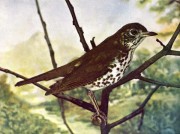This post is rather academic, and also covers stuff I’ve already thrown up here. So I apologize in advance for being pedantic and repetitive. But I need to get this stuff consolidated and thrown up here as part of my process for getting some pedagogical concerns distilled into a longer article. I have some poetry and some field reports coming to leaven the atmosphere when I can get more time to write.
Introduction:
Every fall I teach an advanced composition class called “Writing as a Naturalist” that asks students to write from their direct, personal observation of natural phenomena. Broadly defined, a naturalist acquires experience and expertise in some facet of the natural world in order to educate and enlighten others about it, and while the title can apply to a specific position, say in the education department of a non-profit or governmental science or environmental organization, we use it quite loosely in the class to describe anyone with an interest or attachment in the natural world willing to make a case to a general readership for the importance and meaningfulness of that world. The basic requirement of the class is that the students each week spend a couple hours outside writing about what they observe. Certainly most of the students whom the class attracts enjoy being out-of-doors, and most are pursuing degrees in the natural or environmental sciences, but many of those who would not consider themselves outdoorsy, I think, find the basic requirement of the class at the least refreshingly different. The formal writing assignments are few and relatively simple in scope. The primary piece of work as a culmination of the personal observation of nature is a long essay, twelve to fifteen pages, on some specific aspect of the natural world that the student has observed over the course of the semester. In addition, the students produce two shorter essays, the first discussing some exemplary readings in nature writing and the second connecting the issues raised in those readings to the students’ own initial experiences in direct observation. The students do the writing component of the observations as a journal, and that field journal accounts for a relatively large percentage of the course grade, reflecting its practical centrality to the other writing assignments. The journal entries as a record of each student’s individual encounters with the natural phenomena in which they immerse themselves forms the raw material for the final long essay and much of the second shorter essay, and if the student has not spent a long time looking at and reflecting on something, that student will find little to write about.

